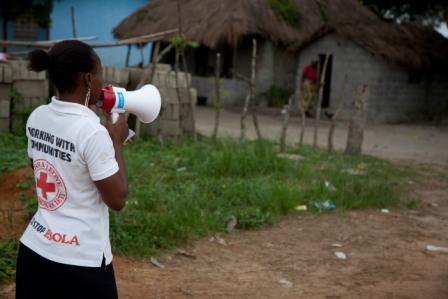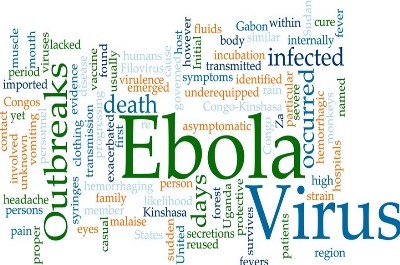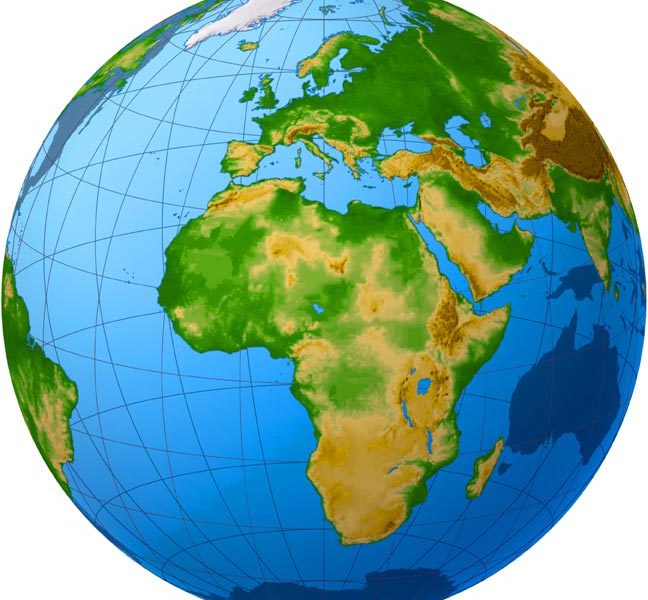UNICEF story: No room for complacency as Sierra Leone approaches zero
Magburaka, 18 August 2015 – Kadiatu Sankoh, Sawunatu Kaikai, and Ousman Koroma make their way along the windy paths of Magburuka town in Tonkolili District spreading their lifesaving messages. The three social mobilizers from the Sierra Leone Red Cross Society, Real Women and SMAC (Social Mobilization Action Consortium) respectively, are on a vital mission to safeguard communities against Ebola. (Photo: Kadiatu Sankoh from the Sierra Leone Red Cross Society spreading Ebola prevention messages in Magburuka Town. ©UNICEF Sierra Leone/2015/Kassaye)
Their direct and personal engagement is critical following the return of Ebola to Tonkolili District after 150 days without any reported cases. The entire neighbouring village of Massesebe was put under Ebola quarantine.
“Our work is important because we want to protect our people so that they cannot become victims to this virus,” said Kadiatu. “That is why we talk to them house-to-house. They are ok with the message because they too love their lives.”
There are only two confirmed Ebola patients remaining in Ebola Treatment Units, both are whom it’s hoped will be released soon, a major milestone for the country which has been fighting Ebola since May 2014 and seen at least 3,586 Ebola deaths. Reaching zero will not only be a triumph for the medical response, but also for the thousands of social mobilizers who continue to ensure that communities know what Ebola is, how it spreads, and what to do if they come across people with symptoms. Sustaining a resilient ‘zero’ will call on all their continued efforts through an active engagement with communities.
UNICEF has been supporting the Government of Sierra Leone and NGO partners to train and activate social mobilizers across the country. After covering the areas immediatel surrounding Massesebe and two other communities that were placed under quarantine in Tonkolili District, they will move further afield, fanning out to ensure the entire district has been covered.
“Tonkolili District went for a long period without a case, then all of a sudden we had one case,” said Kassim Kamara, UNICEF Field Support Officer in Tonkolili. “We needed to revitalize the social mobilization activities quickly, so we gathered the partners together to continue to sensitize the community people, and especially to avoid complacency, because this is a lesson for all other districts having gone over 150 days: you need robust action.”
There is no room for complacency. Magburuka is two miles away from the community that was under quarantine until a few days ago, and high-risk contacts remain in quarantine for another week. The man who came from Freetown with the virus would have had to pass through Magburuka to get to his family in Massesebe. Making sure everyone is aware of what’s going on and mindful of how to prevent catching Ebola is therefore essential to prevent the outbreak from spreading further.
Despite the midday heat ahead of the regular afternoon thunderstorms, the tem continues making its way through the community, making sure they have not missed any households. More than a year into the outbreak, their discussions with villagers reflect the need to do more.
“Some people accept, but some of them still think that the sickness is not in the country,” said Kadiatu. “Some of them believe. Some of them don’t believe. We try to get them to believe by talking to them, telling them about the way some of our families became victims to this disease and died. So you can convince them through that. You know that the sickness is there. We talk to them peacefully. Try to tell them about the disease and how it affects us. When they understand, they will accept.”
Alhussein Tulla is canvassing a nearby neighbourhood and stops at the stall where Fatou Kamara has set up shop selling rice, beans and condiments.
“The message that the mobilizers brought to us is fine,” said Fatou. “I had heard about the outbreak in Massesebe village. I am not happy at all about the situation there. I don’t want to hear that Ebola is anywhere in Sierra Leone, let alone in the neighbouring village. We were really scared at the height of the Ebola crisis. I was not able to do any business. I did not go outside – I was always scared of people coming around and the possibility of getting sick. We are scared again now because it has come back to a village that is very close to us. We fear that it might come here, but we are praying that it will not.”
With the support of partners like DFID, the EU, Irish Aid, Japan and OFDA, UNICEF, in partnership with the Government of Sierra Leone, WHO and NGOs, continues to engage communities in Tonkolili and other districts that have faced recent Ebola outbreaks. House-to-house visits, community discussion, radio programmes, and other social mobilization activities are used to ensure that communities remain alert and vigilant, and that when zero Ebola cases is achieved, we remain at zero.
By Indrias Kassaye
Stay with Sierra Express Media, for your trusted place in news!
© 2015, https:. All rights reserved.






